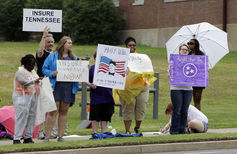Above Photo: Applicants for insurance wait in Richmond, California in 2014. Eric Risberg/AP file photo.
Note: We believe that all people in the United States should have access to health care. This can best be accomplished through a National Improved Medicare for All. Visit our new campaign to win Medicare for All at www.HealthOverProfit.org.
Dismantling the Affordable Care Act (ACA) without a replacement plan is projected to increase the nation’s uninsured population by 18 million in the first year after repeal and by 32 million in 2026, according to recent estimates by the Congressional Budget Office (CBO). As lawmakers and the American public consider repealing portions of the ACA, it is an important time to reflect on what limiting access to health insurance might mean for Americans and their communities. If a repeal occurs, not only individuals, but also their communities, could be affected.
Whether we like it or not, health insurance affects our lives in significant ways. Sometimes these effects are very direct, determining whether we can afford to see a doctor when we need to. At other times, health insurance affects us in less direct ways by shaping whether providers hire that extra nurse or relocate to a wealthier area of town.
One of the things we’ve paid a lot less attention to is whether the effects of health insurance go beyond things like health and costs to shape other aspects of our social lives. My new study with Stefan Timmermans of UCLA addresses this gap by examining the consequences of uninsurance for cohesion and trust in Los Angeles communities during the 2000s.
Using longitudinal data from the Los Angeles Family and Neighborhood Survey (L.A. FANS), we find that people living in communities with lower levels of insurance are less likely to feel connected to and trust their neighbors, even after controlling for several other neighborhood and individual factors that might affect people’s perceptions of and engagement with their communities.
We also test whether broader access to health insurance through a policy like the ACA could strengthen communities over time. This analysis demonstrates that people’s perceptions of their neighbors and communities improve as more people gain access to insurance in their community.
Consequences beyond health care
How does this work?
When large groups of people don’t have health insurance, this places unique financial and organizational strains on individuals, providers and health care markets. Research demonstrates that a lack of access to health insurance negatively affects health, health care access and quality, utilization of preventative services and out-of-pocket costs for the uninsured.
These effects also frequently spill over to the insured, negatively affecting the health and out-of-pocket costs for people living or receiving care alongside large groups of uninsured. Such spillovers come about as providers try to lower their exposure to a large uninsured population by reducing, dropping or redistributing staff and services that are disproportionately used by the uninsured, such as emergency care.
These provider strategies also go on to affect access to health care, quality of care and trust in health care providers for everyone living in a community, not just the uninsured.
Given the particular pressures that uninsurance places on individuals, providers and health care markets, it’s not surprising that we find the consequences of uninsurance go beyond health and health care.
We specifically measured the consequences of living in a community with high levels of uninsurance on residents’ reports of social cohesion, or their feelings of trust, mutual obligation and reciprocity toward their neighbors. Moving from a community where almost everyone has health insurance to one where more than half are uninsured results in a 34 percent decrease in residents’ perceptions of social cohesion in their community, we found.
We tested many possible explanations for this decrease, including differences in the composition of these communities over time, but this result is persistent. There is a social cost for communities that carry a larger burden of uninsured. This 34 percent difference in social cohesion is a substantial difference that has important consequences for other individual and community outcomes pertaining to health, political engagement and more.
New tensions created in communities
There are two primary ways that a lack of health insurance might affect communities.
First, in battles over state and local budgets, attempts to cover the uninsured through the redistribution of new or existing funds may run into political barriers or be forced to compete with other public services such as education and law enforcement. These battles can create competing interests and goals within a community that contribute to the breakdown of social cohesiveness, trust and reciprocity among community members over time.
In case studies of programs intended to expand coverage to the uninsured in Birmingham, Alabama, and Alameda County (Oakland), California, debates around the provision of care for the uninsured became even more contentious because they intersected with racial and class divides that have historically limited access to insurance and health care institutions among African-Americans and Latinos. Sometimes, community institutions, like churches and schools, are able to develop their own programs to support the uninsured, with varying success.
Second, within communities, higher out-of-pocket costs to the uninsured and their families can exacerbate social and economic inequalities which promote class differentiation, social distance and community disengagement.

Importantly, some uninsured individuals feel this status very acutely, as an indicator that they don’t belong or matter to the broader community or society. When the uninsured do seek care, they frequently report experiencing poorer-quality care, discrimination and depersonalization, which they view as an assault on their personal dignity.
Taken together, these indirect pathways suggest that lack of access to health insurance matters not only for health and costs, but also for the cohesiveness and resilience of communities.
Can policies like the ACA strengthen communities?
Where local and state governments have made a concerted effort toward including marginal populations into the health care system, as in San Francisco and Massachusetts, we see promising results. Lawmakers, providers and patients are motivated by the importance they place on connectedness, collaboration and feelings of a shared fate.
In our study, we specifically look at how communities might have changed if an ACA-type expansion in insurance coverage had occurred in Los Angeles County during our survey period (2001 and 2007) using a difference-in-difference estimation. This technique takes into account trends in how feelings of trust and reciprocity among community members would have changed during this time period anyway, even without expanding access to health insurance.
To do this, we use individuals’ reports of their actual health insurance status when they were reinterviewed in 2007-2008 by L.A. FANS and estimate who would become eligible for Medicaid and for California state and federal subsidies to buy insurance in the individual marketplace under 2014 ACA eligibility criteria.

We then used these estimates to see how residents’ feelings of trust and reciprocity might have changed if they and their neighbors had gained access to health insurance coverage under an ACA-type expansion in 2007.
We find that the differences between high insurance and low insurance communities on perceptions of social cohesion are significantly smaller when we impose an ACA-type intervention, suggesting that such an intervention could significantly improve individuals’ perceptions of social cohesion in their communities.
It is not yet clear how a repeal of ACA will affect communities. A repeal may undo any gains that communities have experienced over the past few years in terms of increased trust and reciprocity. These changes may take some time to be felt or may be very pronounced if individuals who stand to lose access to insurance through a repeal feel they are being singled out for exclusion.
What we do know is that prior to the implementation of the ACA, a lack of health insurance substantially undermined communities. As health policies increasingly contend with larger issues of social and economic inequality, we expect that health policies such as the ACA – and whatever comes next – will continue to have important consequences for communities that need to be considered alongside effects on health and costs.

